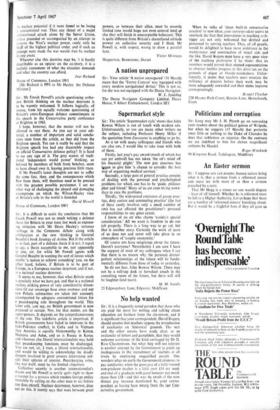Sir: It is difficult to resist the conclusion that Mr
Enoch Powell was not so much writing a defence thesis for Britain in your issue last week as express- ing irritation with Mr Denis Healey's tortuous verbiage in the Commons debate along with exhilaration at the new thinking in General Beaufre's book Strategy of Action. But if the article is, in fact, part of a defence thesis it is not, I regret to say, a thesis acceptable to me, nor apparently to you, sir; for while Mr Powell agrees with General Beaufre in wanting the sort of forces which enable 'a nation to achieve something' you, on the other band, believe, if Britain is to be part of Europe, in a European nuclear deterrent, and if not, in a national nuclear deterrent.
It seems to me, however, that what Britain needs is precisely what we have got, and that is a national nuclear striking power of very considerable dimen- sions (if our sovereign base areas overseas and our new Polaris submarines are taken into account), accompanied by adequate conventional forces for a peacekeeping role throughout the world. This latter role, you say, no British government is now prepared to sustain. Nor, for that matter, are the super-powers. It depends on the comprehensiveness of the role. The indefinite article is important. If British governments have failed to intervene in the Indo-Pakistan conflict, in Cuba and in Vietnam then America is equally blameworthy in Kenya, Malaysia and Aden,. and so is Russia in Korea and wherever else liberal internationalists may hold that peacekeeping functions must be discharged. You are not, sir, I trust, a liberal internationalist, and would be willing to acknowledge the deadly dangers involved in great powers intervening out- side their spheres of interest. Peacekeeping roles, like war itself, must be for limited objectives.
Collective security is another internationalist's dream and Mr Powell is surely quite right to show contempt for a process which renders foreign policy Immobile by calling on the other man to act before one does oneself. Nuclear deterrence, however, does not do this. it merely says that wars between great
powers, or between their allies, must be severely limited (one would hope not even entered into) or else they will finish in unacceptable holocaust. This is quite different from Britain's shamefaced attitude prewar on collective security and I think Mr Powell is, with respect, wrong to draw a parallel here.






























 Previous page
Previous page